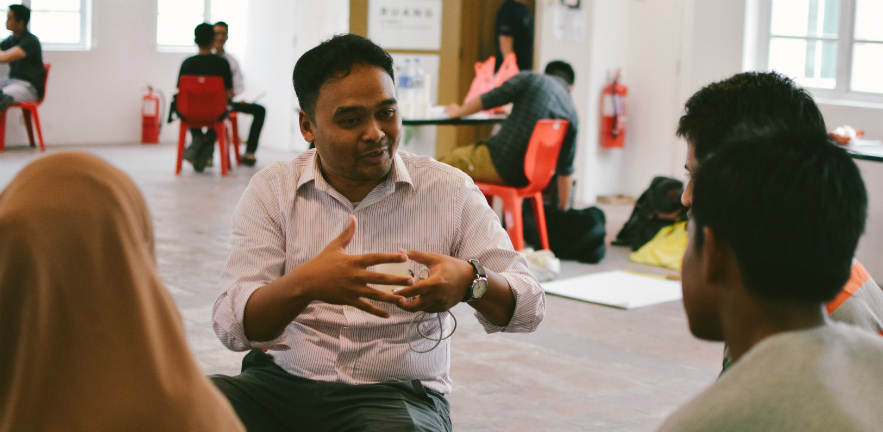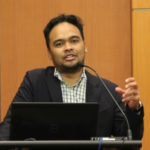An interview with Asrif Yusoff, the head of business venture management at a leading energy company and a part-time student at the Cambridge Judge Business School, on leading social innovation within a corporation.

You hold an MBA from Imperial College, a bachelor’s degree in Industrial Engineering from Northwestern University, and you are currently pursuing a Masters in Social Innovation degree at Cambridge Judge. Can you tell us why you decided to apply for this programme?
I was asked a similar question by a colleague recently, and I told him that people further study for one of three reasons: ambition, boredom or curiosity or ‘ABC’ (I made this up on the fly). I’d originally embarked on postgraduate studies for the second reason, boredom. After eight years of working, I began to feel life stagnating with the nine-to-five routine and thought I needed a new challenge. So I pursued a part-time MBA, which took place about the same time that my wife and I welcomed the arrival of our firstborn. I might have just ‘over-challenged’ myself there.
From originally studying just to break life’s monotony, however, I grew curious about the dynamics between corporations and society. I wanted to know more about the underlying factors influencing how the world functions today. So I decided to ride on the momentum that I had to learn and continued studying.
“I grew curious about the dynamics between corporations and society”
In the Social Innovation Master programme at Cambridge, I found the perfect fit that could help me develop academic depth in an emerging field. The content is multidisciplinary and the cohort is as diverse as one could imagine. Plus, the format allows me to immediately put knowledge to practice in between my quarterly trips between Kuala Lumpur and Cambridge.
You started the website Social Innovation Malaysia. Can you tell us why you want to provide a platform for this topic in Malaysia?
Social Innovation Malaysia began as part of my research for my Masters dissertation. I wanted to reach out to social innovators around the country and understand the ecosystem better. Specifically, the background of their initiatives and the hurdles they are facing to sustain and grow.
After a few interviews, I realised that it would be a missed opportunity if I’d left the content that I’d amassed just sitting in my laptop. I should just put it out there, in the spirit of sharing knowledge. So I launched SI Malaysia for three primary reasons. First, to learn how Malaysian non-profits operate in addressing emerging social and environmental issues. Second, to provide a platform that showcases their works to the wider public. And third, to hopefully inspire others who might have their own change-making ideas to take the next step.
Talk us through your current role. How do you combine your passion for social innovation with your work?
My first encounter with social innovation came before I’ve even heard of the term itself, and it was in the form of social intrapreneurship. A social intrapreneur addresses a social issue from the inside of an organisation. In 2012, I was assigned to a collaboration between our organisation with a host of vocational colleges around the country. The idea was to support these institutions by providing equipment and advisory for their technical training programmes such as welding and construction.
Coming from the industry, we have access to the expertise as well as knowledge about the demands of the energy sector. This provides an opportunity for us to partner with these colleges and help create conducive learning environments for their students. As a result, the students become more employable and are better prepared on the latest needs and demands of their prospective employers.
“This first-hand experience with social intrapreneurship changed my overall perspective in charting my career.”
I was especially affected by students from underserved communities whose lives were changed upon securing employment or even setting up their own companies after the programme. I knew back then that in any role that I play in the organisation, I have to find the higher purpose and meaning to my day-to-day tasks at the workplace.
Today I am responsible for managing the joint ventures of our organisation, and in doing this, we work closely with our partners in creating value both for our ventures as well as the communities that we operate in. I owe it to my employer who has been supportive of my career and academic aspirations since I became a recipient of their undergraduate scholarship in 2001. Today, apart from funding, I have also been able to work on a suitable working schedule as a part-time postgraduate student. I couldn’t have pursued this lifelong learning journey without their help.
You recently presented a paper entitled ‘Addressing inequality in Malaysia through corporate social intrapreneurship’ at the World Engineering, Science and Technology Congress (ESTCON) 2018 in Kuala Lumpur. Can you tell us a bit more about this paper?
The paper began as an assignment during my first term where we were asked to write an essay in response to the following questions: ‘What role do corporations play in the global stratification of wealth? Can social intrapreneurs make a difference?’
I structured the paper into three parts that look into the historical and contemporary views on the role of a corporation, social intrapreneurship as an alternative to traditional corporate social responsibility (CSR), and Malaysia as a case study.
While inequality has been a long-standing issue in the country, the situation has been statistically improving over the past four decades. Efforts toward improving the situation are aplenty, but there is room for improvement in terms of the coordination and collaboration of initiatives that are carried out within the public, private, and social sectors.
Social intrapreneurship as an alternative to traditional CSR
In concluding the paper, I provided three considerations for social intrapreneurs in strategising and developing their respective programmes. First, on the importance of alignment between an organisation’s core competencies and the investments that they make for society. Second, the crucial need for collaboration between the public and private sectors for effective results. And third, the high level of involvement expected of corporations with the causes that they invest in – where it should go beyond merely monitoring.
What advice would you give to other social innovators working in globally influential corporations?
The experience and research that I’ve done so far have taught me that one should never limit themselves. I’ve met many professionals in the corporate world who are keen to do good but are not able to do so as they believe that it can only be outside their current space.
To them, I always say, “Don’t quit your day job!” There is better awareness now on doing good among companies, and it is down to us to identify opportunities to pursue social intrapreneurship from within the organisation. I personally find that always being in a ‘learning mode’ can be incredibly helpful in identifying opportunities for innovation. There is always something new to be learned from our surroundings, so I try to be in this frame of mind in spurring ideas while on-the-job.
“Being in a ‘learning mode’ can be incredibly helpful in identifying opportunities for innovation.”
A good starting point could be looking at CSR beyond merely meeting sustainability standards. Responsible sourcing, for example, should be embedded as a business practice instead of falling under the CSR umbrella, as that would give the impression that the effort is an added-on effort instead of an operational requirement. And employees should know how their daily deliverables at work are impacting society and the environment.
Admittedly, these are not one-size-fits-all solutions, and social intrapreneurship does not come without its challenges. Quantifying value on subjective results can be an arduous task, and this includes convincing management for approval and funding. In the eyes of the social innovator, however, this is where the fun begins.
Interview with Asrif Yusoff, [email protected]
If you are interested in studying social innovation, please visit the MSt in Social Innovation web pages to learn more.
Asrif Yusoff (MSt in Social Innovation 2017) is currently the head of business venture management at a leading gas infrastructure company in Asia. He has over ten years of experience in the energy sector, and is determined to create value for both his organisation and the communities in which they operate. As a passionate advocate for social innovation, his research looks into the roles that corporations can play in addressing socioeconomic inequality.




Leave a Reply